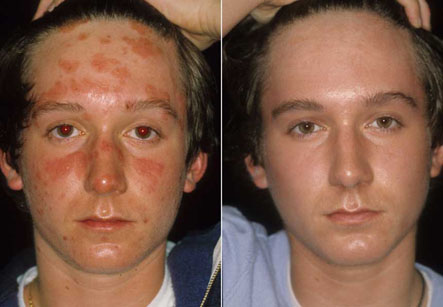Eczema
Introduction
Eczema is a group of dermatological conditions in which the skin becomes inflamed or irritated. This disease is a very common skin ailment. The most common type of it is atopic dermatitis, or atopic eczema. Atopy means a genetic tendency of an individual to develop other allergic conditions like asthma and hay fever. This disease starts mainly in childhood and generally the manifestations stop in about 10 years. But sometimes, it continues to manifest throughout life. With appropriate treatment, the disease can be controlled.
Symptoms of Eczema:
1. The disease appears as a rash on the face, back of the knees, wrists, hands or feet. But other areas can also be affected. The essential feature of any eczema lesion is itching. Itching can appear with the rash or before the rash.
Keeping skin moisturised using emollients (medical moisturisers) is key to managing all types of eczema with topical steroids commonly used to bring flare ups under control

2. In people with fair skin, the lesions start as reddish areas and then turn brown. But in dark skinned people, eczema affects the pigmentation. It can cause lightening or darkening of skin color in that area. These lesions are scaly, dry and thickened.
3. In infants, the patches can appear anywhere but they are typically itchy, crusty and oozing. It mostly affects face and scalp.
Cause of Eczema:
The exact cause of eczema is unknown or is called as idiopathic. But the likely cause maybe an overactive immune response to an irritant. This response manifests as symptoms of eczema. The cause maybe genetic as eczema is found in families with history of asthma or other allergies.
The exposure to certain substances or conditions can cause flare up of the rash like:
1. Contact with rough or coarse materials
2. Extremes of temperature
3. Contact with soap or detergent
4. Animal dander
5. Upper respiratory tract infection or cold
6. Physical or mental stress.
The cure of this disease is not there, but it can be controlled with medical treatment and precautions to avoid suspected irritants.
Diagnosis:
The condition can be diagnosed by a pediatrician, dermatologist or general physician by its appearance. Allergy tests are also performed as eczema is associated with other allergies. This can help in determining possible irritant or stimulus. In children, the allergy testing is more useful.
Treatment:
1. Itching with dry skin is the main symptom of the disease as it causes scratching and excoriation which causes infections. This can be treated with lotions and creams to keep the skin moist. These are applied after bath as the skin is damp at that time and thus retain the moisture of the skin.
2. Cold compresses can be used to relieve itching.
3. Role of steroids- Steroids can be used to treat eczema as they damp the immune system. 1% hydrocortisone cream, prescription creams and ointments containing corticosteroids are used to reduce inflammation. Oral corticosteroids are reserved for reducing severe inflammation.
4. If infection occurs at the area of affection, antibiotics are given to kill the bacteria causing infection.
5. Anti-histaminics are used to reduce sever itching of eczema.
6. For resistant cases, tar treatments, ultraviolet light phototherapy and cyclosporine are other treatment options.
7. Topical immunomodulators are a new modality of treatment for mild or moderate eczema. They act by altering the immune response to the irritants. But there is concern of risk of cancer associated with these medications. So they should be used with caution only when other options of treatment have failed. They should not be used in children under the age of 2 years.
Prevention of flare ups:
Simple solutions can avoid eczema exacerbations or reduce their severity.
1. Moisturizers should be used frequently
2. Avoid sweating and extreme cold temperatures
3. Stress should be avoided or reduced
4. Rough clothes should be avoided for e.g. wool
5. Harsh soaps, detergents and solvents need to be avoided.
6. Avoid foods that cause flare up of symptoms
7. Contact with animals should be limited
8. Respiratory infections and cold should be treated promptly.